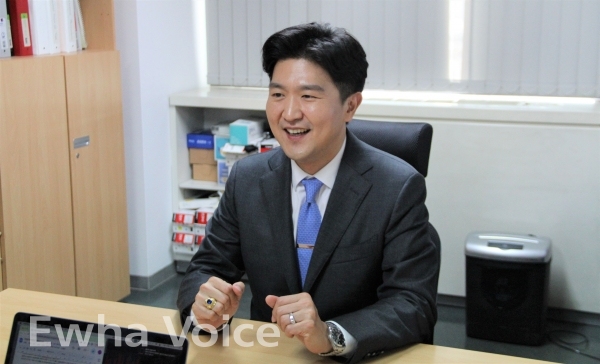
In order to encourage rice consumption and support healthy diets among college students, the Ministry of Agriculture, Food, and Rural Affairsinstated the 1,000 won breakfast policy.
In this program, the cost of the breakfast is split three ways, with the government contributing 1,000 won, the student paying 1,000 won, and the school covering the rest of the expense for the breakfast.
The policy was initiated in 2017 across 10 schools as a pilot project. However, it was not until 2022 that it began garnering positive reactions from students. As a result, the number of participating schools increased to 28, which was approximately 40 percent greater than the previous year. The popularity and demand continued to rise, leading to an abrupt jump in the number of schools selected from 41 to 145 schools in 2023, including Ewha Womans University.
Byoung Hoon Seok, an associate professor from the Department of Economics, explained that the policy which was initiated quite a long time ago, has received a recent surge of interest mainly due to high inflation.
“In 2017, the term ‘high inflation’ was uncommon, so the 1,000 won breakfast did not sound as attractive,” Seok said. “But now, with the escalating speed of the consumer price index, 1,000 won for breakfast has become more attractive to students.”
From an economic perspective, however, Seok raised several concerns about the policy.
The first concern is on the 1,000 won breakfast hindering the school’s ultimate role, especially when the budget is limited.
Despite the rising cost of food over the years, the policy’s mechanism of 1,000 won support from the government, 1,000 won from the student, and the rest covered by the school has remained the same.
For example, in the past, the school only had to pay 2,000 won for a 4,000 won meal. Due to inflation, the meal now costs at least 5,000 won, meaning the school must cover 3,000 won for each meal, which is a 50 percent increase.
“The fundamental purpose of schools is to invest in education and research,” Seok argued. “So the policy is an unnecessary expense that blurs the school’s primary role.”
Furthermore, with the funds coming from tuition, Seok stressed that spending should be equally distributed by establishing more advanced hybridclasses or by offering additional support to departments in arts, sports, and sciences.
“Through this, all students, regardless of whether they eat breakfast or not, will benefit from the school,” Seok remarked.
Another concern about the policy is the method the government has used to support the youth. The 1,000 won breakfast was initiated under a youth policy to lessen the financial burden of college students. However, Seok explained that the two main goals a youth policy has to pursue are providing a strong support system for jobs and ensuring affordable housing for the youth.
Seok mentioned previous research which reported that small companies and self-employed businesses create job opportunities for young people. Therefore, corporate tax reductions for big corporations that invest in these industries would facilitate more investments.
“Cutting taxes for the rich is surely a controversial topic, but I am purely speaking from an economic perspective,” Seok added.
For affordable housing, the government’s role is crucial to help the youth afford houses. The current government promises a policy that allows young people to purchase housing at a much more affordable price. However, about the question of creating another apartment “lottery” plan, Seok emphasized the need to expand the supply so that more young people may be able to afford houses.
“The government will need to invest in these two areas instead of making extra policies like the 1,000 won breakfast policy to put money into,” he stated.
Seok concluded that the policy will be difficult to maintain. The tuition freeze on colleges along with the low birth rate will make it increasingly difficult for schools to continue covering the rest of the cost of meals for their students.
“Along with a slow stabilization of inflation rate in progress, the demand for the 1,000 won breakfast will decrease, considering the lack of attention it received when initially introduced in 2017,” Seok said. “This will lead to the government abandoning the policy.”
As an economics expert, Seok suggested that colleges and governments need to utilize their limited budgets wisely, focusing more on the younger generation’s necessities.
“We need to think in the long run and consider which policies are really aiming for the future of our students,” he emphasized.

